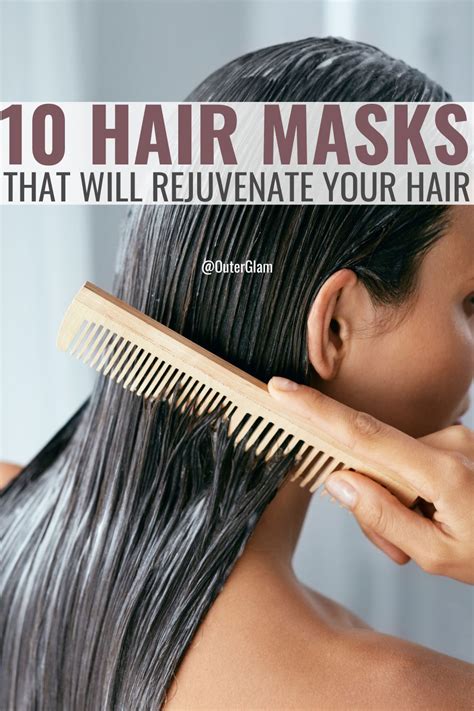Understanding Damaged Hair
Damaged hair is a common concern that affects many people. It can result from various factors, including chemical treatments, heat styling, excessive brushing, UV exposure, and environmental pollutants. Damaged hair exhibits characteristics such as:

- Dryness: Lack of moisture, leading to brittle and rough hair
- Split ends: Breakage and fraying at the hair tips
- Frizz: Uncontrolled hair strands due to weakened cuticles
- Dullness: Loss of luster and shine
- Reduced elasticity: Inability to stretch and return to its original shape
Benefits of Hair Masks for Damaged Hair
Hair masks offer numerous benefits for damaged hair, including:
- Deep conditioning: Penetrates deep into the hair shaft to moisturize and nourish
- Repairing damage: Helps strengthen weakened hair cuticles and reduce split ends
- Promoting hair growth: Stimulates hair follicles to encourage healthy growth
- Reducing frizz: Smooths the hair surface and aligns cuticles
- Adding shine: Enhances light reflection for a lustrous appearance
9 Effective Hair Masks for Damaged Hair
1. Coconut Oil Mask:
Coconut oil, rich in fatty acids, deeply moisturizes and penetrates the hair shaft, repairing damage and reducing split ends.
2. Argan Oil Mask:
Argan oil, known as “liquid gold,” contains high levels of vitamin E and antioxidants. It nourishes and protects damaged hair, promoting elasticity and reducing dryness.
3. Avocado Mask:
Avocados are rich in vitamins A, D, and E, as well as healthy fats. They deeply condition and repair damaged hair, leaving it soft and manageable.
4. Banana Mask:
Bananas, containing potassium, vitamins, and antioxidants, help strengthen and repair damaged hair. They also promote moisture retention and reduce frizz.
5. Honey Mask:
Honey, a natural humectant, draws moisture into the hair. It also contains antioxidants and antibacterial properties, helping repair damage and promote hair growth.
6. Yogurt Mask:
Yogurt, rich in protein and lactic acid, strengthens hair and repairs damage. It also exfoliates the scalp, removing dead skin cells and promoting hair growth.
7. Olive Oil Mask:
Olive oil, high in oleic acid, nourishes and moisturizes damaged hair. It helps restore elasticity and reduce frizz, leaving hair soft and shiny.
8. Mayonnaise Mask:
Mayonnaise, containing eggs and oil, deeply conditions and repairs damaged hair. It also provides moisture and nourishment, promoting hair growth.
9. Shea Butter Mask:
Shea butter, known for its high fatty acid content, deeply moisturizes and nourishes damaged hair. It helps seal in moisture, prevent breakage, and reduce frizz.
Choosing the Right Hair Mask for You
When choosing a hair mask for damaged hair, consider the following factors:
- Hair type: Different hair types require different levels of moisture and nourishment.
- Damage severity: The severity of hair damage determines the frequency and type of hair mask needed.
- Ingredients: Opt for hair masks with natural and nourishing ingredients that target damaged hair.
- Consistency: Choose a hair mask with a consistency that works well for your hair type and damage level.
Application of Hair Masks
To apply a hair mask for damaged hair:
- Wash and towel-dry your hair.
- Apply the hair mask to your hair from roots to tips, avoiding the scalp.
- Massage the mask into your hair, allowing it to penetrate.
- Cover your hair with a shower cap or plastic wrap.
- Leave the mask on for the recommended time, typically 15-30 minutes.
- Rinse the mask thoroughly with warm water.
- Style your hair as usual.
Frequency of Hair Masking
The frequency of hair masking depends on the severity of damage and your hair type. Generally, it is recommended to apply a hair mask once a week or every two weeks for damaged hair.
Common Mistakes to Avoid
When using hair masks for damaged hair, it is important to avoid common mistakes such as:
- Overusing hair masks: Excessive use can weigh down hair and strip it of natural oils.
- Leaving the mask on for too long: Prolonged application can lead to dryness and hair breakage.
- Applying the mask to the scalp: Avoid applying hair masks directly to the scalp as they can clog hair follicles and cause irritation.
- Using harsh ingredients: Opt for hair masks with natural and gentle ingredients to avoid further hair damage.
- Not rinsing the mask thoroughly: Incomplete rinsing can leave behind residue and weigh down hair.
Conclusion
Damaged hair requires extra care and nourishment to restore its health and vitality. Hair masks, when used correctly, can effectively repair damage, promote hair growth, and enhance the overall appearance of your hair. By choosing the right hair mask and following the application guidelines, you can achieve healthier, stronger, and more beautiful hair. Embrace the transformative power of hair masks and unlock the beauty of your damaged locks.
